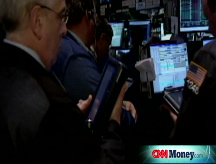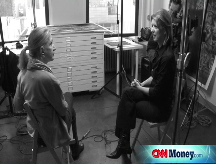U.S. loses another bid to jail Madoff
Ruling comes after government prosecutors appeal of magistrate judge's decision to keep accused swindler out of jail.
NEW YORK (CNNMoney.com) -- A judge rejected an appeal by prosecutors Wednesday in the government's continuing legal quest to put accused white-collar schemer Bernard Madoff behind bars.
The appeal came after a magistrate judge's ruling Monday that Madoff could await trial under house arrest rather than in jail.
U.S. District Judge Lawrence McKenna heard the case on Madoff, who is charged with one count of securities fraud for allegedly operating a $50 billion Ponzi scheme that reportedly affected high-profile charities, celebrities, and many other investors.
McKenna said prosecutors failed to show that Madoff was either a danger to the community or a flight risk.
The ruling follows attempts by the prosecutors last week to have Madoff jailed after he mailed more than $1 million worth of diamond-studded jewelry to friends and family.
U.S. Magistrate Judge Ronald Ellis of the U.S. District Court denied prosecutors' attempts to revoke Madoff's bail, so the prosecutors appealed.
Ellis' ruling was met with an uproar from members of the public who resented that Madoff would spend his time before the trial in his Manhattan penthouse apartment instead of a jail cell.
Assistant U.S. Attorney Marc Litt had argued the attempt to send the jewelry packages demonstrated Madoff's willingness to violate conditions of his bail.
Litt said it showed there is no set of conditions, short of detention, that can stop Madoff from further harming the community.
"The issue is whether the defendant can be trusted to live up to the bail conditions set by the court," Litt said.
In their in their written appeal on Tuesday, prosecutors said Madoff "should not be trusted with a second chance to dissipate assets." They said Madoff's earlier violation of his "asset freeze" shows "that he could not be trusted to obey the Court's orders, and that no set of conditions could restrain his ability to harm the community."
Ira Lee Sorkin, Madoff's lead attorney, said the government had failed to prove that Madoff was a flight risk or that he could continue to dissipate assets that belong to defrauded investors.
"There are no assets to dissipate," Sorkin said. "The test here is whether or not Madoff is a serious risk of flight."
Madoff has been under house arrest, with electronic monitoring, in his $7 million Manhattan apartment, having placed $10 million bail against his home, as well as his wife's residences in Montauk, N.Y., and Palm Beach, Fla. If convicted, the 70-year-old could face up to 20 years in prison and a $5 million fine.
The prosecution argued that Madoff violated bail by trying to keep his Cartier and Tiffany jewelry out of government hands. Sorkin said Madoff didn't know he was doing anything wrong, and was only trying to hold onto "sentimental" items.
Ellis said Manhattan federal prosecutors failed to prove Madoff is a danger to the public or a flight risk. In the end, Ellis said Madoff could stay at home so long as the "portable" valuables at his Manhattan home are inventoried, and all outgoing mail is inspected.
For weeks, a gaggle of reporters has camped in front of Madoff's apartment building, chronicling his every move.
Madoff has been there since December, when he was charged with one count of securities fraud for allegedly stealing up to $50 billion from investors through an elaborate Ponzi scam that carried on for generations. In this type of theft, money from new investors is used to pay off earlier investors to create the appearance of legitimate returns.
Much of the investigation has focused on rounding up Madoff's assets to pay back his victims, assuming he's convicted. In this regard, the accused swindler has been less than cooperative.
In addition to mailing out five packages containing some 15 watches as well as bejeweled cufflinks, rings and necklaces, Madoff is accused of planning to transfer up to $300 million to protect it from seizure. Prosecutors said that 100 signed and ready-to-send checks totaling $173 million were found in Madoff's apartment.
Meanwhile, a host of Madoff's alleged victims - from Wall Street, Palm Beach and Europe - claim that he won their trust, then ruined them. Alleged victims include banks, like Spain's Banco Santander (STD) and Britain-based HSBC (HBC), well-heeled celebrities, like director Steven Spielberg and actor Kevin Bacon, and non-profit organizations.
The Elie Wiesel Foundation for Humanity, a non-profit founded by the Nobel prize-winning Holocaust survivor and "Night" author, said it had $15.2 million under management by Bernard Madoff Investment Securities.
"We are deeply saddened and distressed that we, along with many others, have been the victims of what may be one of the largest investment frauds in history," said the non-profit, in a written statement on its Web site.
The Madoff case emerged as the U.S. finance industry was already reeling from the worse recession since the Great Depression of the 1930s. The case has been so disruptive to Wall Street that the House Financial Services subcommittee held a hearing on Jan. 5 to find out how the Securities and Exchange Commission could allow such a massive debacle to unfold undetected.
-- CNN's George Lerner contributed to this report. ![]()




